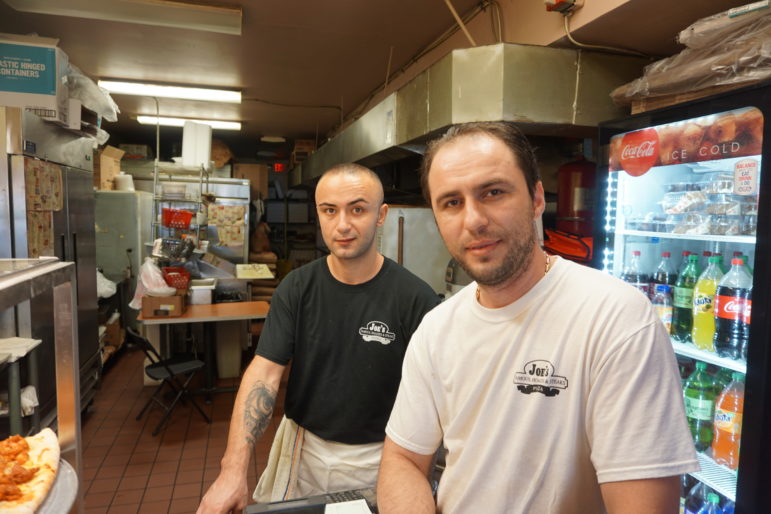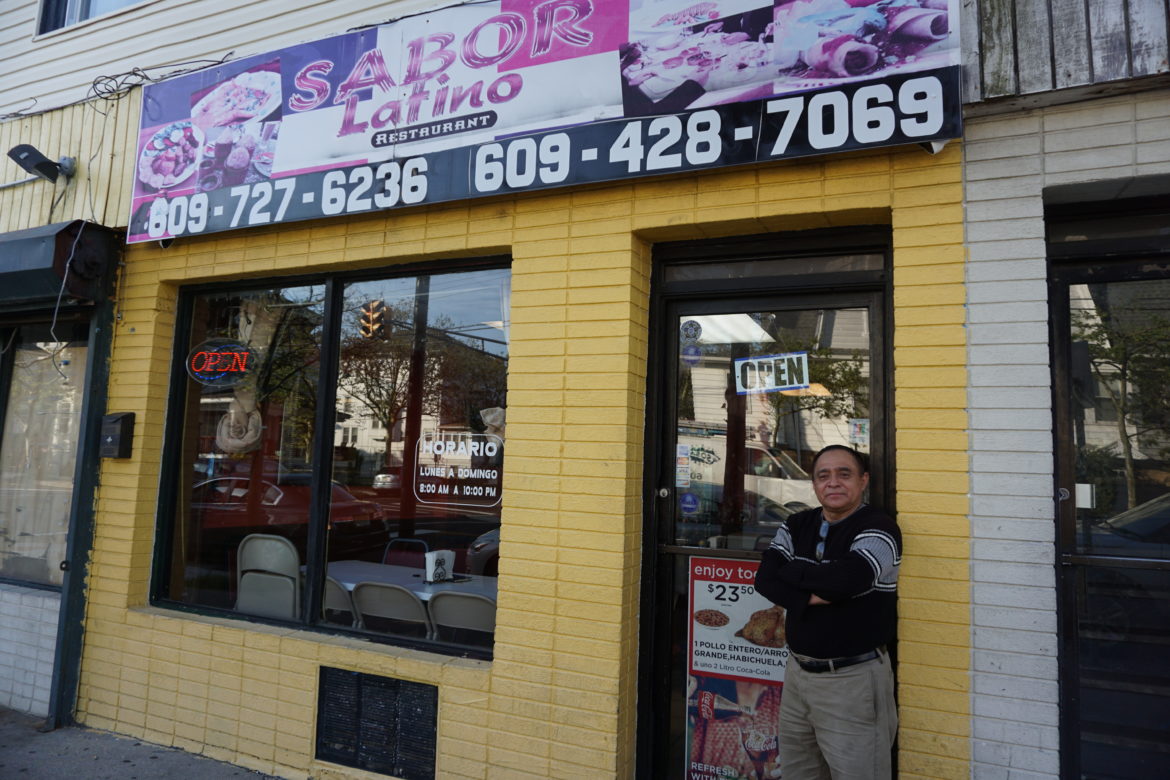This story was produced as part of Stories of Atlantic City, a collaborative project focused on telling restorative, untold stories about the city and its people. Stories of Atlantic City is funded with a grant from the NJ Community News and Information Fund at the Community Foundation of New Jersey.
You’d be hard pressed to say it was a thriving Main Street, but the barbershop, Mexican restaurant, pizza place, tobacco store, mini-mart and even the closed-looking gift store are all open on a short span of Atlantic City’s Ventnor Ave, between Harrisburg and Trenton. In an age of dying malls and online shopping, something is working here in the Lower Chelsea neighborhood.
It’s working not because it’s the kind of functional, mixed-use development that money can’t stimulate. It’s not because of the neighborhood’s wide sidewalks, its transport, or its school. And it’s definitely not because of any business association or chamber of commerce. These store owners don’t talk to each other. Most of them can’t.
Fadil Rama, who runs the pizza place (Joe’s Pizza), moved to Atlantic City from Albania when he was 17. This gave him an incentive to work hard here, he said. “We come from poorer countries,” he said. “I’m not an educated person… I have no diploma, I have nothing. So for me it’s run a business here. You follow the rules, you pay the taxes, over here it’s a free country… Americans don’t want to work. They say, let these people work.”

Not one of the business owners or managers on the block with Joe’s Pizza was born in the United States.
The barbershop? It’s run by a Honduran. The Mexican restaurant? A family from Oaxaca, Mexico. The tobacco store belongs to a Pakistani family and the mini-mart is run by a Bangladeshi. The mysterious import/export gift shop with dusty china vases in the window is the property of a family from Hong Kong.
A few blocks further down Ventnor Ave, restaurant-owner Oscar Melgar agreed that being an immigrant is an incentive to work. “This country offers so many opportunities,” said Melgar, who has lived here for years since emigrating from El Salvador. Melgar learned to cook here and opened Sabor Latino three years ago. “We have to work to provide for our families and to give back to this country that has sheltered us and given us so many opportunities.”
Two thirds of the residents in Census Tract 3 were born abroad. It’s the most diverse area in South Jersey and it ranks no. 11 in the state by foreign-born population, according to the Census Bureau’s 2017 estimates (see the map here or below).
For some, the incentive to work is tied to a desire to get out of Atlantic City. “I wound up here by accident, now I’m stuck here,” said David Nam, owner of Angie’s Cleaners, an alterations and dry-cleaning store on the same block as Sabor Latino. Nam moved to the United States with his parents from Korea as a teen. In the eighties and nineties he worked in finance. He had a successful career. He also became a professional blackjack player and at one point he made it to the World Series of Poker. “You do something good for a long time, you become professional. But if you gamble for a long time you become a junkie,” he said, laughing.
Nam said the city and the state should work together to improve Atlantic City’s fortunes. He said real estate values in Korea have soared since he was last there in the nineties (a six-year Blackjack jag). This city has “location, location, location” but neither the city or the state has any vision, he said.
The Hong Kong Chinese owners of the closed-looking import/export store also want to close their store, so they can retire. They care about their property’s value, too. They would say yes to letting the Atlantic City Arts Foundation paint a mural on their wall, but they’re concerned about what it would look like when it peels.
The Harrisburg-Trenton block is tree-lined, but with the kind of scraggly, burned-out trees that withstand Absecon Island’s salt-water wind. The faux-brick walls of Stockton University’s Atlantic City campus loom from the next block. There is general dissatisfaction that the university’s return to the city last fall, helped by millions of dollars in the kind of tax incentives that are now under state scrutiny, has failed to bring much of a pickup in business.
Rama said he sees some students, but they have a pizza place of their own inside their academic building. There is tough competition for some of the businesses in Lower Chelsea. There is a pizza place, a barber shop and convenience store on nearly every block.
It doesn’t work out for everyone. Between Dover and Annapolis, a convenience store has signs in three different languages. One is a “for sale” sign.
The drug trade at this end of Atlantic City is less visible, but it’s still there. Some stores — the ones with ATMs, mostly — struggle to keep dealers from coming inside with their customers.
Muhammad Usman Zia runs the tobacco store, owned by a relative, between Harrisburg and Trenton. He said everyone told him business was better in Atlantic City years ago. He was a lawyer in Pakistan, before moving here a few years ago.
Across the street at the mini-mart, Huka Meya was more upbeat. You can be whatever you want to be in America, he said. “From pizza delivery man you can become a senior database manager,” he said. “It’s what you want to put into it for yourself, that’s how I look at it.”
There are several stores being renovated on the blocks on either side of Harrisburg and Trenton. It was not clear what they would be. Another pizza place? Another barbershop? “People live for a dream,” Nam said. “I’m here. I still survive.” Nam dreams of restoring his credit and taking time away from the dry cleaning store. “That’s what people live for. If you don’t have a dream it’s not living.”
This story was produced as part of Stories of Atlantic City, a collaborative project focused on telling restorative, untold stories about the city and its people. The project was produced in partnership with Free Press, the Center for Cooperative Media at Montclair State University, ivoh (Images of Voices and Hope), Stockton University, Authentic City Partners and ThisIsAC co-founder Evan Sanchez, Grace & Glory Yoga and The Leadership Studio co-founder Alexandra Nunzi, Press of Atlantic City, Route 40, SJNtv and Breaking AC. Stories of Atlantic City is funded with a grant from the NJ Community News and Information Fund at the Community Foundation of New Jersey, a partnership of the Geraldine R. Dodge Foundation and John S. and James L. Knight Foundation. To read other stories produced as part of the project, visit www.storiesofac.com.
Stories of Atlantic City launch party
Meet the people featured in the Stories of Atlantic City series during a launch party to celebrate the collaborative project. The party will start with a panel discussion and be followed by community networking.
When: Tuesday, May 21 from 5:30 p.m.-7:30 p.m.
Where: The Leadership Studio, 161 S. Tennessee Ave.
RSVP: Via Facebook at bit.ly/RSVPStoriesofAC
